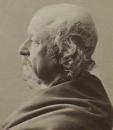Lyric Masque.
Written in verse form, The South-Sea Sisters was commissioned for the opening of the Intercolonial Exhibition of Australasia, Melbourne in 1866. Richard Fotheringham (q.v.), in his introduction to the masque in Australian Plays for the Colonial Stage : 1834-1899 (q.v.) asserts, however, that 'it was almost certainly' Charles Horsley who commissioned it. Although involving no acting, dancing or stage settings as such, and thus barely qualifying as drama, the spectacle presented does resonate with notions of theatre and theatricality. In this respect an estimated 300 singers and instrumentalists participated in the performance.The unaccompanied sections were read by the principal singers.
The Argus wrote of Horsley's contribution to the event : 'The South Sea Sisters is a lyric masque of unquestionable merit... [the symphony of which] intended to convey the idea of the primeval wilderness [in] Hayden's Chorus, but without the appropriation of a single phrase. The somber character of the music was sustained by striking and original passages in the first chorus "Deep in the Stony Silence of the Earth, The Wealth of Nations Lies." Following the recitative, "The Deep Hoarse Mirth Quells", sung by Mr Angus, comes the second part, beginning with "The Rolling Ships and the Rolling Sea". The second part also contains "The March of all Nations", in which Horsley manages to introduce and combine with surprising ingenuity several popular airs. Another chorus, "The Corroboree Chorus," is described in the Argus as being 'intended to musically imitate the native corroboree, and shows wonderful versatility... the words were so rendered by the chorus as to electrify the audience, and bring down thunders of applause" (27 October 1866, Supp p7). The Age reports, too, that it was encored three times (25 October 1866, p7). In her biography of R. H. Horne (q.v.), Ann Blainey (q.v.) also writes that the masque 'delighted audiences... it's aboriginal choruses, rhythmically designed to suggest a corroboree, brought the audience to its feet, a triumph that no bewailing of critics next day could destroy' (p234).
The 'South Sea Sisters' in the title refers to the seven Australasian colonies (including New Zealand). In his libretto, Horne calls for 'a young and vigorous new nation to replace the 'ponderous paws' and 'gorged body and brain' of the grey old lion of Britain' (ctd. in Fotheringham p195).


